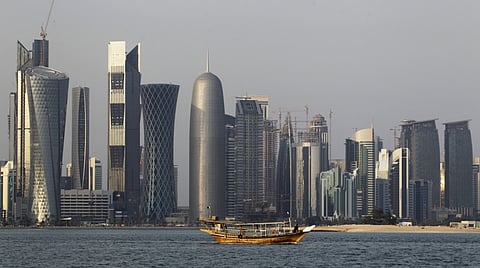Doha must heed voices of reason
Qatar’s tilt towards Iran and Turkey threatens the security and sovernity of its Arab neighbours

It is encouraging, one would hope, that the latest Saudi initiative to open the borders for Qataris who want to perform their rights and duties as Muslims, in Haj, might itself represent an opening to end the current deadlock in the region. This step, though relatively small, should hopefully convince the Qatari officials that it is still possibile to re-engage with its Arab Gulf neighbours and Egypt, with the ultimate aim of achieving a reconciliation.
The Saudi King, Salman Bin Abdul Aziz, took the decision of reopening the borders with Qatar for Haj pilgrims, last Thursday, after almost three months of boycott. Saudi Arabia, the UAE, Bahrain and Egypt broke off relations with Doha because of its continued aid to terror groups, harbouring members of the Muslim Brotherhood and interfering in the internal affairs of its neighbouring nations.
The Qatari Foreign Minister, Shaikh Mohammad Bin Abdul Rahman Al Khalifa, described the Saudi initiative as a “politically motivated decision”. Such comments are not going to be helpful in the long run. Qatar is urgently required, and sooner rather than later, to move forward and openly talk about the serious issues that the Arab quartet considers to be of concern to their current stability and future prosperity.
Doha will be committing probably the gravest error of judgement in its entire short history since independence, if it ever decides to replace the ‘brotherly’ relations with its immediate Arab neighbours with that of Iran’s and Turkey’s. Neither country has Qatar’s national interests at the top of their agendas. With Iran’s declared aim to ultimately expand its regional control from the Gulf to the warm waters of the Mediterranean and the Red Sea shores of Yemen, Tehran is eagerly looking forward to such an opportunity that Qatar’s dilemma might, wittingly or unwittingly, offer. Any such move towards Iran will certainly be of grave consequences, not only to the rest of the Arab Gulf states and beyond, but most certainly to Qatar itself. Iran, in view of its divisive policy in the region, looks at Qatar as yet another contender to potentially extend its influence. Tehran had previously tried to test its ability to do so with Bahrain, but failed. The Iranians are also viciously creating havoc in Yemen since 2013. They have made some headway in directing the political moves in the Iraqi capital of Baghdad, by creating and supporting its alternative military power (Army of the Popular Mobilisation) in tandem with Iraq’s national army. With the direct assistance to the Damascus regime of President Bashar Al Assad through its own ‘Revolutionary Guards’ and Hezbollah, Tehran is also firmly contributing into efforts of shaping up new geopolitical facts in Syria. The Iranians are equally holding the ailing democracy in Lebanon to ransom, by controlling the power of Hezbollah members of parliament.
However, having failed so far in the Gulf, Qatar remains, for the aggressively ambitious Tehran, the ‘jewel in the crown’. If it falls into Iran’s camp, it will be a major achievement of Tehran in moving towards its ultimate goal of influencing events in the entire region.
Therefore, the Iranians would understandably consider Qatar to be their immediate target to pursue to fulfil their desired policy. It is a peninsula strategically sitting as a geo-economic body in the Gulf, hugely rich and influential state located between the UAE and Bahrain. Its geography forms an appendix in the lower part of the Gulf, where its northernmost part of the sleepy town of Al Ruwais, forms a strategic part of the peninsula. Being at the gate of Saudi Arabian territories, Iran considers Qatar’s location of profound importance in case the current crisis goes in their direction. Al Ruwais practically presents any Iranian expansionist planners with a better option than the UAE islands of Abu Mousa and the Greater and Lesser Tunbs, occupied by Iran since early 1970s, because of its higher altitude.
But, Doha has hurriedly turned to Turkey in an attempt to redress the balance that has politically tilted away from it and in favour of the four Arab states. Qatar has invited the government of President Recep Tayyip Erdogan to immediately intensify its military presence in the country, and increase the number of the Turkish force by 3,000 soldiers. This is unprecedented military presence of a non-Arab force in an Arab country, which many consider as a threat to the security and stability of the Gulf Cooperation Council countries and beyond. Such action by Turkey may backfire against itself if circumstances take a confrontational outcome. To seek military assistance from a non-Arab country against neighbouring Arab countries is historically unprecedented.
It is worth reminding ourselves that Qatar had signed a military pact with Turkey in 2014, three years before the current crisis. Why did Qatar sign that pact? Was it anticipating a crisis with its Arab neighbours? Saudi Arabia, UAE and Bahrain recalled their ambassadors from Qatar in March 2014 because of the latter’s solid backing of the Muslim Brothers and other extreme Islamists. Diplomatic relations resumed eight months later when Qatar ejected some of the Brotherhood’s leading members from the country and silenced others.
Qatar’s dilemma this time is several times tighter and the most sensible way out of this predicament is to listen to reason.
— Mustapha Karkouti is a columnist and former president of the Foreign Press Association, London. You can follow him on Twitter at @mustaphatache


